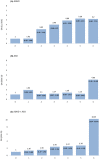Early childhood allergy linked with development of attention deficit hyperactivity disorder and autism spectrum disorder
- PMID: 35754118
- PMCID: PMC9328193
- DOI: 10.1111/pai.13819
Early childhood allergy linked with development of attention deficit hyperactivity disorder and autism spectrum disorder
Abstract
Background: Previous studies reported controversial results regarding the association between allergic disorders and attention deficit hyperactivity disorder (ADHD)/autism spectrum disorder (ASD). The aim of this article was to investigate whether allergic disorders are associated with ADHD/ASD in a large cohort of pediatric patients.
Methods: A retrospective study using the pediatric (0-18 year) database (ICD-9-CM codes) of Clalit Health Services during the years (2000-2018). Diagnosis of all disorders was made by specialist physicians.
Results: A total of 117 022 consecutive non-selective allergic children diagnosed with one or more allergic disorder (asthma, rhinitis, conjunctivitis, skin, food, or drug allergy) and 116 968 non-allergic children were enrolled to our study. The mean follow-up period was 11 ± 6 years. The presence of allergic disorders in early childhood (mean age of allergic diagnosis 4.5 ± 4.3 years) in boys as well as in girls significantly increased the risk to develop ADHD (O.R 2.45, CI 2.39-2.51; p < .0001), ASD (O.R 1.17, CI 1.08-1.27; p < .0001), or both ADHD + ASD (O.R 1.5, CI 1.35-1.79; p < .0001). Children with more than one allergic comorbidity revealed a much higher risk. In a multivariable analysis (adjusted for age at study entry, number of yearly visits, and gender), the risk of allergic children to develop ADHD and ADHD + ASD, but not ASD alone, remained significantly higher.
Conclusion: Allergic disorder in early childhood significantly increased the risk to develop ADHD, and to a less extend ASD, in later life.
Keywords: ADHD; ASD; gender; pediatric allergic disorders; risk factor.
© 2022 The Authors. Pediatric Allergy and Immunology published by European Academy of Allergy and Clinical Immunology and John Wiley & Sons Ltd.
Conflict of interest statement
The authors whose names are listed below declared that there is no conflict of interest in the subject matter or materials discussed in this manuscript.
Figures

Similar articles
-
Comorbidity of Atopic Disorders with Autism Spectrum Disorder and Attention Deficit/Hyperactivity Disorder.J Pediatr. 2016 Apr;171:248-55. doi: 10.1016/j.jpeds.2015.12.063. Epub 2016 Feb 2. J Pediatr. 2016. PMID: 26846570
-
Longitudinal association between early atopic dermatitis and subsequent attention-deficit or autistic disorder: A population-based case-control study.Medicine (Baltimore). 2016 Sep;95(39):e5005. doi: 10.1097/MD.0000000000005005. Medicine (Baltimore). 2016. PMID: 27684861 Free PMC article.
-
Early developmental pathways to childhood symptoms of attention-deficit hyperactivity disorder, anxiety and autism spectrum disorder.J Child Psychol Psychiatry. 2019 Sep;60(9):963-974. doi: 10.1111/jcpp.12947. Epub 2018 Jul 2. J Child Psychol Psychiatry. 2019. PMID: 29963709 Free PMC article.
-
Association between childhood asthma and attention deficit hyperactivity or autism spectrum disorders: A systematic review with meta-analysis.Clin Exp Allergy. 2021 Feb;51(2):228-252. doi: 10.1111/cea.13750. Epub 2020 Oct 13. Clin Exp Allergy. 2021. PMID: 32997856
-
A systematic review of comorbidity between cerebral palsy, autism spectrum disorders and Attention Deficit Hyperactivity Disorder.Eur J Paediatr Neurol. 2019 Jan;23(1):31-42. doi: 10.1016/j.ejpn.2018.10.005. Epub 2018 Nov 2. Eur J Paediatr Neurol. 2019. PMID: 30446273
Cited by
-
Atopic Dermatitis and Autism Spectrum Disorders: Common Role of Environmental and Clinical Co-Factors in the Onset and Severity of Their Clinical Course.Int J Mol Sci. 2024 Aug 16;25(16):8936. doi: 10.3390/ijms25168936. Int J Mol Sci. 2024. PMID: 39201625 Free PMC article. Review.
-
Link between the skin and autism spectrum disorder.Front Psychiatry. 2023 Oct 18;14:1265472. doi: 10.3389/fpsyt.2023.1265472. eCollection 2023. Front Psychiatry. 2023. PMID: 37920540 Free PMC article.
-
Early childhood neurodevelopmental milestones in children with allergic diseases: the Japan Environment and Children's Study (JECS).Sci Rep. 2024 Mar 18;14(1):6460. doi: 10.1038/s41598-024-57210-y. Sci Rep. 2024. PMID: 38499597 Free PMC article.
-
Additive or Interactive Associations of Food Allergies with Glutathione S-Transferase Genes in Relation to ASD and ASD Severity in Jamaican Children.J Autism Dev Disord. 2024 Feb;54(2):704-724. doi: 10.1007/s10803-022-05813-7. Epub 2022 Nov 27. J Autism Dev Disord. 2024. PMID: 36436147
-
Adverse food reactions and alterations in nutritional status in children with autism spectrum disorders: results of the NAFRA project.Ital J Pediatr. 2024 Nov 4;50(1):228. doi: 10.1186/s13052-024-01794-8. Ital J Pediatr. 2024. PMID: 39497088 Free PMC article.

